Subscribe to the DRL Newsletter
-
Expand entry
-
Things are moving fast in the DRL world recently, as we are branching out to new initiatives. We might need to increase the frequency of the Newsletters again to fit it all in…
News
Reading Group Blueprints incoming!
We are nearly ready to release the new section of the DRL mentioned in the previous Newsletters. In early 2022, you will gain access to a number of Reading Group Blueprints, allowing students to easily set up reading groups on topics not taught at their universities. Our choice of topics is informed by Annie McCallion’s AHRC-funded research project, in which she analysed the curricula of a range of UK universities and interviewed a number of students to identify topics that are in high demand yet very rarely taught. The research outputs will be published alongside the Blueprints.
We are planning to regularly expand that section by adding new Blueprints. We invite you all to join us in this effort! If you have an idea for a Blueprint focused on one of the topics suggested by Annie’s research, get in touch!
The first DRL Seminar Series
In September and October we hosted Decolonising Knowledge: An online seminar series across four continents. Organised by Andreas Sorger (spotlight below) and Clotilde Torregrossa (spotlight in February 2020 Newsletter), it featured talks by Linda Tuhiwai Smith, Veli Mitova, Murad Idris and Leigh Jenco. You can read more about it on our new Events page, and if you didn’t have a chance to attend, you can watch the recordings on our brand new YouTube channel. We are planning to build on the success of this series and organise more seminars in the near future. We are grateful to the British Philosophical Association for their support in organising and promoting the series!
A whole new Diversity Reading List
A few months ago we have been approached by the University of Utrecht-based Decolonisation Group, who were interested in creating their own Diversity Reading List in History. Since then, we worked out how to best approach such an expansion and we are currently collaborating on the development of a sister site based on the Philosophy DRL. The History site will feature a whole new category system and entirely new content. We plan to see it go live within a year, and hope that this development might herald the creation of additional Lists in other disciplines.
Contribution Drive
We have a lot of projects going on now, but we can’t forget about our original mission: providing you with a database of texts and teaching advice. And we need your help! Join us by sending content through our Contribute page, OR organising a Contribution Drive event (or edit-a-thon) in your own community!
If you wish to organise a Contribution Drive, let us know and we can help you out. One of our team members can come to your department or institution (online or in-person when possible) to lead the effort, explain how the DRL works and give you some tips on diversification.
Update on the improvements to PhilPapers
Anna Klieber (spotlight in November 2019 Newsletter), has now re-categorised thousands of feminist philosophy texts on PhilPapers, improving their visibility and availability to people browsing the database. This fantastic achievement addresses some of the issues identified in a recent paper by the DRL manager Simon Fokt, and it has been completed thanks to the initiative of the MIT Reading on Gender and Philosophy group and the kind help of the PhilPapers editors. We are very happy to see those changes and hope that they will inspire further improvements in the future.
The Philosophy Exception launches
If you haven’t heard already, you should definitely check out The Philosophy Exception, a fantastic new online resource presenting a rich catalogue of works on philosophy’s problems with equity, diversity, and inclusion. The texts are divided into four categories that will help you find the content you’re looking for: Calls to Action; Documentation; Theorizing; and Interventions. We’re very excited about this project and will update you on how it develops in the future!
New BPA/SWIP UK report
We’re also excited to report that Jenny Saul and Helen Beebee have published the updated version of the BPA/SWIP UK report on the state of women in Philosophy in the UK, ten years after its first iteration. The report notes some improvements, e.g. a substantial increase in permanent staff who are women (up from 24% to 30%) and professors who are women (19% to 25%). The DRL is also mentioned among other websites and resources for our efforts to ‘make students aware that there are women philosophers’!
Volunteer Spotlight: Andreas Sorger

I am a PhD researcher at the London School of Economics and Political Science working on the intersection between racism and philosophy. Specifically, my thesis examines whether there are racist structures of thought embedded in our philosophical heritage that affect the ways in which we conceptualise philosophical questions or problems in the present. Thus, it seeks to explore racism as a problem for our philosophical thinking, and attempts to figure out what we can do to mitigate the pernicious effects this has on how we do philosophy today. Prior to starting my PhD, I completed a Masters degree at the University of St Andrews.
I first became involved with the Diversity Reading List after attending an academic conference, and was asked to put together a self-guided reading group on postcolonial theory for students. The task was incredibly rewarding – it felt like designing my own course – and it was great to think about putting together a set of readings that incorporate a number of diverse perspectives while still being internally linked with one another. From there, it was a natural next step to think about putting together a seminar series that focuses on similar themes, which took place earlier this year and would not have been possible without the support of several people involved with the DRL.
Get involved, get funded!
We continuously expand our list and you can help us by contributing papers via our contribution page.
We couldn’t do what we do without the help of our fantastic volunteers. If you would like to join them and volunteer for us please get in touch! There are so many ways to get involved: creating new Reading Group Blueprints; adding new list entries; helping us with small one off jobs; becoming a regular editor; and promoting the DRL at events and online.
You might even be able to access funding to support your time working on the DRL. We’re keen to support any volunteers in getting this kind of funding. You can read more about this here.
Thanks so much again for all your support,
The DRL Team
-
Expand entry
-
Things are happening slowly in pandemic times, but recently we have been gathering some serious speed, getting involved in more and more fantastic projects. Here are some fresh news from the diversity world.
News
AHRC grant project update
Annie McCallion’s project is nearly finished! She gathered a lot of data about the content of the curricula at a range of UK universities, interviewed a number of students, and joined forces with Suddhasatwa Guharoy and Andreas Sorger to create two research group blueprints. All of this will be published in the coming months and it will inform the development of new sections of the DRL.
Want to create a blueprint?
We are now looking for volunteers to help us with the project started by Annie. The idea behind a research group blueprint is simple: if a group of students wants to organise a reading group on a topic that is not covered in their curriculum, they need a starting point. A blueprint. What should they read? What questions to cover? What connections to make? If you have an idea for a research group blueprint you’d like to create, or you would like to create one on a topic suggested by Annie’s research, get in touch!
Inspiring improvements to PhilPapers
In a recent paper, the DRL manager Simon Fokt, drew attention to some problematic features of such popular scholarship databases as PhilPapers. In short, some of the ways in which content is categorised and structured in such databases has a tendency to marginalise already marginalised authors, topics and traditions. A group of proactive philosophers centered around the MIT Reading on Gender and Philosophy group decided to turn Simon’s recommendations into action, seeking to help PhilPapers address some of the issues identified and thus further improve this valuable resource. Anna Klieber, a DRL volunteer featured in our November 2019 Newsletter, will take the lead on the project. It’s focus will be on improving the visibility of feminist philosophy categories by changing parts of the category tree, moving feminist categories out of the ‘Misc’ sections, and recategorising a huge number of papers.
Recategorise your papers!
Following this, we call for your help! If your paper is categorised on PhilPapers under, say, Feminist Epistemology, but not under just Epistemology or the specific subcategory of epistemology it is actually about, it might be less easily found and thus might less often read and referenced. Moreover, it might be discounted by some as not as relevant, important or valuable as texts which appear in the non-feminist category. So, now is the time to change this! As Anna is about to start the project, you can help them by suggesting the right categories your paper should appear in! All you need to do, is find it on PhilPapers and click on (categorize this paper) under its list of categories. Let’s all help make the change happen!
Diversity in PM
The Philosophers’ Magazine most recent issue is all about diversity. Check it out for fantastic texts covering a variety of issues, from an updated report on the representation of women at UK universities, to a fantastic student voice on the experience of studying philosophy. The issue also includes another piece by Simon, where he claims that there is, in fact, nothing more philosophical than diversity.
Volunteer Spotlight: Annie McCallion

I am currently a PhD student at the University of Manchester (UK) and my thesis addresses women’s underrepresentation in Philosophy. I blend feminist metaphilosophy with empirical methods to explore the causes of women’s attrition from the undergraduate to professional levels.
I first became interested in diversity in Philosophy in 2016 when I began work on the In Parenthesis Project: A project which examines the collective corpus of Mary Midgley, Iris Murdoch, Philippa Foot and Elizabeth Anscombe and attempts to establish them as Analytic Philosophy’s first all-women Philosophical school. During my time with the In Parenthesis project it became increasingly obvious to me just how much women and other marginalised groups were ignored in the construction of Philosophy syllabuses. To remedy this, I put together a student study guide for the In Parenthesis Project before sharing this with the DRL. I am now jointly engaged in a project to expand the DRL by developing a student-specific section which can house interviews with students and data I have collected on Philosophy syllabuses across the UK, as well as a variety of similar study guides designed to help students educate themselves about philosophical topics that the data shows to be underrepresented.
Get involved, get funded!
We continuously expand our list and you can help us by contributing papers via our contribution page.
We couldn’t do what we do without the help of our fantastic volunteers. If you would like to join them and volunteer for us please get in touch! There are so many ways to get involved: reviewing public contributions; helping us with small one off jobs; becoming a regular editor; and promoting the DRL at events and online.
You might even be able to access funding to support your time working on the DRL like Chris (see above). We’re keen to support any volunteers in getting this kind of funding. You can read more about this here.
Thanks so much again for all your support,
The DRL Team
-
Expand entry
-
The pandemic has been difficult to us all, and had its impact on the DRL as well. Fortunately, we are gathering speed again with a whole low of new developments we would love to tell you about!
News
AHRC grant project
Anne-Marie McCallion, who completed some great volunteer projects with us, has just won the North West Consortium Doctoral Training Partnership grant covering a Research Placement and Partnership with the DRL! This means that Annie’s AHRC doctoral funding will be extended for three months, allowing her to apply her research expertise in developing resources which will enrich the DRL. The main outputs for this project will involve expanding the List to include more student-focused materials such as reading group programmes, and offering a better insight into student opinions on how representative their syllabi are. Congratulations, Annie!
Update-a-thon incoming!
The European Philosophy of Science Association Women’s Caucus will hold an event to add more texts to the DRL! The participants will be meeting on Zoom to chat, have a drink, brainstorm authors and texts to add, and divide the work of adding them. If you would like to join or know more, check out the EPSA Women’s Caucus Facebook Group or sign up to their Mailing List. Once you do so, you will receive the Zoom link. Huge thanks go to Dana Tulodziecki and the organisers for this fantastic initiative! We are looking forward to meeting you there!
Contribute in bulk
Some of you pointed out that our current contribution form is best designed for contributing individual texts, but is less useful when contributing in bulk. Great point! If you would like to contribute a larger number of texts, you can now do so using the Bulk Contribution Sheet available through the Contribute Page. In it, you can easily copy information such as author name and details from cell to cell without having to type it in each time. We hope this will make contributing even easier, and we thank you for the suggestion!
Volunteer Spotlight: Björn Freter

Björn works as an independent researcher based in Knoxville, USA. He main research areas include political philosophy, African philosophy, post-colonial philosophy and animal ethics. He feels passionately about promoting philosophy as a humane matter which takes all human voices into account.
He works intensively on diversification and desuperiorisation of philosophy. Björn understands his work with the Diversity Reading List an important practical commitment to the project of humanizing philosophy.
Get involved, get funded!
We continuously expand our list and you can help us by contributing papers via our contribution page.
We couldn’t do what we do without the help of our fantastic volunteers. If you would like to join them and volunteer for us please get in touch! There are so many ways to get involved: reviewing public contributions; helping us with small one off jobs; becoming a regular editor; and promoting the DRL at events and online.
You might even be able to access funding to support your time working on the DRL like Chris (see above). We’re keen to support any volunteers in getting this kind of funding. You can read more about this here.
Thanks so much again for all your support,
The DRL Team
-
Expand entry
-
How the world has changed since our last newsletter! We hope you managed to stay safe over the last months, and that you’re finding your way through online teaching and learning! Here are some things we’ve been up to since.
News
Site remodel
Based on the survey we conducted last year, we have now upgraded the website, adjusting its look and functionality to the way it is being used. Search and browsing are now more prominent, less used elements have been moved out of the way, teaching texts display better, and there are a number of other minor improvements. We hope you’ll like the new design, and thank you to all who took part in the survey!
A surge in contributions
Following our last big expansion, we received a lot of new contributions – thank you! We managed to publish them all within days of receiving, so it seems that our new system is working well. Massive thanks to all contributors, and we hope you’ll continue to send us more suggestions in the coming weeks! Please also remember you can expand on our existing entries, or add comments to stub entries!
Bloomsbury Encyclopaedia of Philosophers for free
One of the most diverse resources detailing the work and biographies of philosophers from multiple traditions and backgrounds, is now free to use on request. ‘Change your conception of the canon’ is their motto, and we can assure you that browsing through the catalogue of over 8,000 thinkers from all over the world can be quite fascinating and eye-opening. Check it out now!
Volunteer Spotlight: Chris Blake-Turner (he/him or they/them)
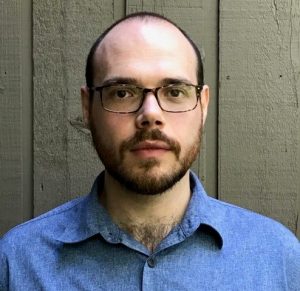 I’m a PhD student at the University of North Carolina at Chapel Hill, writing a dissertation on reasoning and inference. Before that, I did undergraduate and masters degrees at the Universities of Durham and Oxford, respectively. I’ve been involved with the DRL for just over a year, as an Editor Assistant in Asian Philosophy, Epistemology, and Logic. I’ve also just finished an APA-funded project, working with Clotilde Torregrossa on expanding the DRL’s database with 351 texts contributed by the public. It’s great to see people taking up the call to contribute to the DRL; consistent public contributions will really help take things to the next level.
I’m a PhD student at the University of North Carolina at Chapel Hill, writing a dissertation on reasoning and inference. Before that, I did undergraduate and masters degrees at the Universities of Durham and Oxford, respectively. I’ve been involved with the DRL for just over a year, as an Editor Assistant in Asian Philosophy, Epistemology, and Logic. I’ve also just finished an APA-funded project, working with Clotilde Torregrossa on expanding the DRL’s database with 351 texts contributed by the public. It’s great to see people taking up the call to contribute to the DRL; consistent public contributions will really help take things to the next level.I’m grateful for the opportunity to be part of such an important project. I’ve relied on the DRL in the past when designing courses, and will continue to do so even more in the future. I think that others are starting to see the value in doing so too, and I hope that the DRL’s status as a crucial aid in course design will only become more secure. Along with making our pedagogy more inclusive (see Jacquart et. al 2019 on this: http://doi.org/10.5840/teachphil2019417102), diversifying our syllabi is one best things we can do for students and for the profession as a whole.
Get involved, get funded!
We continuously expand our list and you can help us by contributing papers via our contribution page.
We couldn’t do what we do without the help of our fantastic volunteers. If you would like to join them and volunteer for us please get in touch! There are so many ways to get involved: reviewing public contributions; helping us with small one off jobs; becoming a regular editor; and promoting the DRL at events and online.
You might even be able to access funding to support your time working on the DRL like Chris (see above). We’re keen to support any volunteers in getting this kind of funding. You can read more about this here.
Thanks so much again for all your support,
The DRL Team
-
Expand entry
-
New Year, New Newsletter!
It seems like the year has barely started, and yet we’re nearly in the middle of term! We have been very busy over this winter and are looking forward to telling you all about it.
News
We have just completed a massive List expansion!
First, the huge news. Thanks to generous funding from the APA Diversity Grant, tireless work of our grant holders, and a great deal of help from our team of volunteers, we have just added a whopping 351 new entries to the DRL, meaning you can now browse well over 1000 texts! This is the largest single expansion so far, and it was only possible thanks to the contributions of dozens of our readers all over the world (check out who they are here!). Since the DRL launched in 2015, we have received a great number of public contributions. There were so many, we have struggled to keep up with them ever since, and only now managed to catch up. So: we have officially no backlog now and all the texts contributed can be browsed on the site.
PhilPapers updates
As we added new texts to the DRL, we quickly discovered that many of them have not been featured on PhilPapers. We set out to fix this, adding around 50 new entries to PP, thus increasing the representation of authors from under-represented backgrounds on it.
New model for contributions
Having completed that project, we will now introduce a new model for public contributions, substantially cutting the time needed to publish entries. We would like to strongly encourage you to take this opportunity and send us more texts, which will appear on the site within days. You can contribute using our form here!Stub entries
We are also now introducing a new type of entry. A ‘stub entry’, similarly as on Wikipedia, is an incomplete public contribution which might be lacking some elements (for example, a full teaching comment). We introduce it to speed up the process of publishing entries, and invite you to help us complete such entries. Each one of them will include links allowing you to send us your comments on how to complete it, and you will see your suggestions applied within days.Volunteer Spotlight: Clotilde Torregrossa (she/her)

I am currently a fixed-term lecturer at the University of St Andrews where I got my PhD in January 2020. My work is on aesthetics and metaphilosophy and at the moment, I am particularly interested in conceptual engineering and social philosophy. I got involved with the DRL in 2017 when Simon Fokt asked me to manage our social media accounts (Facebook and Twitter). I have also been helping to maintain the list when and where I can, most recently by completing our APA-funded expansion (351 texts!) with Chris Blake-Turner.
What I love about working for the DRL is getting to see my colleagues making a habit to check the list when they write their syllabi or research their papers. The DRL is becoming, slowly but surely, a staple of academic philosophy and I am very proud to be able to participate in this change (even by posting and Facebook and tweeting!).
Get involved, get funded!
We continuously expand our list and you can help us by contributing papers via our contribution page.
We couldn’t do what we do without the help of our fantastic volunteers. If you would like to join them and volunteer for us please get in touch! There are so many ways to get involved: reviewing public contributions; helping us with small one off jobs; becoming a regular editor; and promoting the DRL at events and online.
You might even be able to access funding to support your time working on the DRL like Clotilde Torregrossa (see above). We’re keen to support any volunteers in getting this kind of funding. You can read more about this here.
Thanks so much again for all your support,
The DRL Team
-
Expand entry
-
The DRL Newsletter is back!
Time flies and the end of term is very near! Read on to find out what we have been up to over the last months. Also, now that the teaching is almost over, why not take all of those interesting texts you taught and contribute them to the DRL, offering some neat teaching comments while it’s all fresh in your mind?
News
The first Northern Diversity Forum
We have just been to York, to the first workshop organised by the Northern Diversity Forum we helped to create. With fantastic talks from Alya Khan (London Met) and Anne-Marie McCallion (Manchester), we spent an afternoon talking about the philosopher’s mythical norm, exploring the concept of dissociative disagreement, and learning more about Women in parenthesis. We also shared some thoughts about the DRL, talking about its history and our future plans. Big thanks to the organisers of the event, and we are looking forward to seeing you at the next NDF workshop in the spring!Women in Parentesis collaboration
Last time we mentioned that we are planning a collaboration with Women in Parenthesis, a project promoting the work of the Wartime Quartet and constructing reading lists allowing students to learn more about the work of fantastic women philosophers. We now have the first results of this collaboration, as Anne-Marie McCallion (Manchester) helped us add the content from their lists to the DRL. You can see the effects in the Latest Additions list!Large expansion incoming!
We also have an update on the APA Diversity Grant which is helping us go through all of the public contributions we received in the past, but didn’t have the time to add to the live list yet. Thanks to the fantastic work by Clotilde Torregrosa (At Andrews) and Chris Blake-Turner (Chapel Hill), with the help by Francesca Bruno (Cornell), more than 300 of those will soon be available to you as ‘stub entries’. In place of our usual teaching comment, they will have a note inviting you to expand them with your own notes. Massive thanks to all who contributed all of those texts over the years – please keep them coming!Volunteer Spotlight: Anna Klieber (they/them)
 Even though academia is in theory directed at the (equal) dissemination of knowledge and education, in reality this is, very often, not the case. I’m interested in and getting involved with equality, diversity and decolonization issues because I think this is a way to challenge the problems we are having in a neoliberal, capitalist university-system, and to provide a more equal and accessible space within philosophy to discuss these issues; while of course we also need to continuously reflect within these spaces how we actually are addressing and meeting various problems of exclusion people face.
Even though academia is in theory directed at the (equal) dissemination of knowledge and education, in reality this is, very often, not the case. I’m interested in and getting involved with equality, diversity and decolonization issues because I think this is a way to challenge the problems we are having in a neoliberal, capitalist university-system, and to provide a more equal and accessible space within philosophy to discuss these issues; while of course we also need to continuously reflect within these spaces how we actually are addressing and meeting various problems of exclusion people face.I hope that the Northern Diversity Forum can, to some extent, be or become such a space. I got involved with the NDF in particular, because, for one, I’ve enjoyed organising events in the past, but especially because I think that projects dedicated to issues of equality, diversity and decolonization are desperately needed. I hope that future events will attract many more people, draw attention to political issues of our time, and provide a platform to philosophically discuss these topics – but also give opportunities to scholars working on these topics to present their work to an interested crowd. Visibility and representation is important, but it is a constant process, and my hope for the future of the Northern Diversity Forum is that we can keep engaging in that process to make the forum and the discussions we want to pursue more accessible and diverse.
Get involved, get funded!
We continuously expand our list and you can help us by contributing papers via our contribution page.
We couldn’t do what we do without the help of our fantastic volunteers. If you would like to join them and volunteer for us please get in touch! There are so many ways to get involved: reviewing public contributions; helping us with small one off jobs; becoming a regular editor; and promoting the DRL at events and online.
You might even be able to access funding to support your time working on the DRL like Emily Paul (see above). We’re keen to support any volunteers in getting this kind of funding. You can read more about this here.
Thanks so much again for all your support,
The DRL Team
-
Expand entry
-
Welcome back to the DRL Newsletter!
It’s almost the start of the 19/20 academic year, can you believe that! If you are planning a new course this year, do consider using the DRL to diversify your syllabus. And if you have a bit of spare time, you might want to contribute some of the fantastic texts you plan to use in your classes!
Have your say!
Final chance to take part in a short survey on how you use the DRL! Your answers will help us improve and further develop the List.
News
APA Diversity Grant
The DRL is pleased to say we have won the APA Diversity Grant. Barbara Cann (Cornell) will be using this money to go through our backlog of public contributions and turning them into ‘stub entries’ – ones that might miss teaching comments but will invite you, the readers, to submit your own comments and advice. We hope that this will become the first stage of a wider plan to make contributing new texts easier and quicker.
(in parenthesis) and DRL Collaboration
In our last newsletter we wrote about an excellent project, (in parenthesis), which celebrates the work of four women philosophers from Oxford: Iris Murdoch, Elizabeth Anscombe, Philippa Foot, and Mary Midgley. Since then, we began collaborating on a project aiming to add the content of their reading lists to the DRL database, including useful references to their teaching notes from the DRL, and possibly developing new complete reading lists based around the work of the Wartime Quartet.
Teaching Text from Ian Kidd
We have some great advice by James Ian Kidd in the Teach section of our website. The text focuses on how to avoid backfires and bad trade-offs when diversifying our curricula. Check it out!
Volunteer Spotlight: Alison Stone
I am a Professor of Philosophy at Lancaster University. I have written a number of books, some of them on feminist philosophy such as An Introduction to Feminist Philosophy (2007). I am an Assistant Editor for the DRL, having contacted Simon Fokt to offer my assistance in 2018, at a time when I was also an interim co-editor of the journal Hypatia. At that point I’d just begun work on my current project, which is a study of women’s contributions to nineteenth-century philosophy, especially in Britain and other English-speaking parts of the world. As part of that, I’m presently co-editing a special issue of the British Journal for the History of Philosophy on women in nineteenth-century philosophy, and I’m carrying out research in this area. Some of the better-known figures to be covered are Marian Evans (a.k.a. George Eliot), Harriet Martineau, Harriet Taylor Mill and Ada Lovelace. But there are many more women from that time whose names are now forgotten and yet who were big names in their day. So, anyway, I was keen to add to the DRL’s entries in history of early and late modern philosophy – as well as in continental European philosophy, which is another field of interest for me.
The DRL is such a valuable resource. Philosophy departments are increasingly starting to appreciate that syllabi, reading lists, course handbooks and so on need to be more inclusive than they have been and there really seems to be a growing interest amongst philosophers in diversifying and decolonising the philosophy curriculum. It is exciting to see the subject in a process of change.
Get involved, get funded!
We continuously expand our list and you can help us by contributing papers via our contribution page.
We couldn’t do what we do without the help of our fantastic volunteers. If you would like to join them and volunteer for us please get in touch! There are so many ways to get involved: reviewing public contributions; helping us with small one off jobs; becoming a regular editor; and promoting the DRL at events and online.
You might even be able to access funding to support your time working on the DRL like Emily Paul (see above). We’re keen to support any volunteers in getting this kind of funding. You can read more about this here.
Thanks so much again for all your support,
The DRL Team
-
Expand entry
-
Welcome back to the DRL Newsletter!
As Easter terms and fall semesters draw to an end, read on to find out what’s been happening at the Diversity Reading List in the last few months.
Have your say!
We invite you to take part in a short survey on how you use the DRL. Your answers will help us improve and further develop the List.
News
MAP–DRL Workshop: Creating Inclusive Classrooms’ In St Andrews
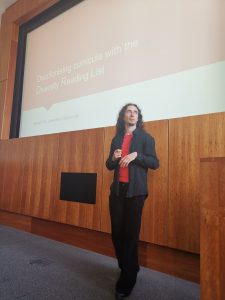 We collaborated with the MAP chapter at St Andrews and Stirling to put up a successful workshop. The primary aim of the event was to respond to a growing need in our classrooms: offering inclusive teaching practices and a diversified syllabus engaging to all of our students, including those traditionally underrepresented in higher education, which includes, but is not limited to, women, BME, disabled, and first-generation students.
We collaborated with the MAP chapter at St Andrews and Stirling to put up a successful workshop. The primary aim of the event was to respond to a growing need in our classrooms: offering inclusive teaching practices and a diversified syllabus engaging to all of our students, including those traditionally underrepresented in higher education, which includes, but is not limited to, women, BME, disabled, and first-generation students.We heard from Anne-Marie McCallion, a PhD candidate at the university of Manchester, in the departments of both philosophy and sociology, on ‘Disassociated disagreement: the impact of extracted speech on undergraduate philosophers’. Then Ian James Kidd, an assistant professor in philosophy at Nottingham, discussed ‘Diversity, inclusion, and the risks of backfiring’. Finally, our very own Simon Fokt, the project manager of the DRL, gave a presentation on the DRL, what it’s been doing and what it needs in the future. The event closed with a panel-type discussion session with the speakers and Lisa Jones, the St Andrews Philosophy DoT. The last session was very fruitful and both speakers and audience offered practical insight and tips on inclusive teaching. A successful event, with hopefully more to come!
Philosophy by Postcard
There is a charming project currently running, set up to celebrate the work of Iris Mudorch. Participants write a postcard to a philosopher who is broadly sympathetic to Mudorch’s approach. The philosopher then responds to the postcard. To learn more about the project, and to see how to send your own postcard, see here.(In Parthesis)
The Philosophy by Postcard Project is just one part of a wider project to celebrate the work of 4 women philosophers from Oxford: Iris Murdoch, Elizabeth Anscombe, Philippa Foot, and Mary Midgley. To learn more visit their website.CFP: Conference By Women In Philosophy
There will be a conference which aims to “ provide a platform for undergraduate and graduate women philosophers to present their work to their peers”, to be held in Groningen. See their call for papers here.Lady Mary Shepherd continued
The DRL and the undergraduates at Edinburgh are campaigning to have a statue of Mary Shepherd erected. An undergraduate at Edinburgh has written a blog post about this process, which you can read here. And there has been some intrest from the press too, which you can read here.Volunteer Spotlight: Alison Toop
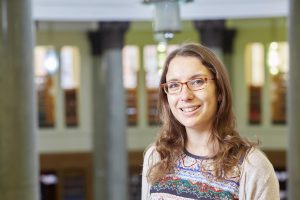 I am a Teaching Fellow in medical ethics at the University of Leeds. I have just completed my PhD on the nature of the romantic relationship and the legitimacy of a political institution of marriage. I am currently an Assistant Project Manager for the DRL, but I first got involved back in 2014/15 when Simon Fokt was setting up the project in Leeds. Initially I didn’t feel confident enough to review papers and produce entries for the website – I had only just got back into academic philosophy after a few years in the ‘real world’, and I hadn’t yet started teaching. Luckily there was still loads for me to do. I had a background in writing grant applications for charities, and so I started writing them for the DRL. I also started helping with the promotion of the project online and at events. And that’s what I continue to do today five years later!
I am a Teaching Fellow in medical ethics at the University of Leeds. I have just completed my PhD on the nature of the romantic relationship and the legitimacy of a political institution of marriage. I am currently an Assistant Project Manager for the DRL, but I first got involved back in 2014/15 when Simon Fokt was setting up the project in Leeds. Initially I didn’t feel confident enough to review papers and produce entries for the website – I had only just got back into academic philosophy after a few years in the ‘real world’, and I hadn’t yet started teaching. Luckily there was still loads for me to do. I had a background in writing grant applications for charities, and so I started writing them for the DRL. I also started helping with the promotion of the project online and at events. And that’s what I continue to do today five years later!It’s been fantastic watching the project grow from strength to strength. My research focuses on some brilliant female philosophers, and that definitely inspired me to get back into philosophy. I was shocked when I started my PhD at how much of an issue under-representation was in the world of academic philosophy. I am proud to be part of a project that aims to make that world a much more inclusive place.
Get involved, get funded!
We continuously expand our list and you can help us by contributing papers via our contribution page.
We couldn’t do what we do without the help of our fantastic volunteers. If you would like to join them and volunteer for us please get in touch! There are so many ways to get involved: reviewing public contributions; helping us with small one off jobs; becoming a regular editor; and promoting the DRL at events and online.
You might even be able to access funding to support your time working on the DRL like Emily Paul (see above). We’re keen to support any volunteers in getting this kind of funding. You can read more about this here.
Thanks so much again for all your support,
The DRL Team
-
Expand entry
-
Welcome back to the DRL Newsletter!
We hope that you had a good start of the year. We definitely did! Read on to find out what’s been happening at the Diversity Reading List in the last few months.
Have your say!
We invite you to take part in a short survey on how you use the DRL. Your answers will help us improve and further develop the List.
News
MAP & DRL Workshop
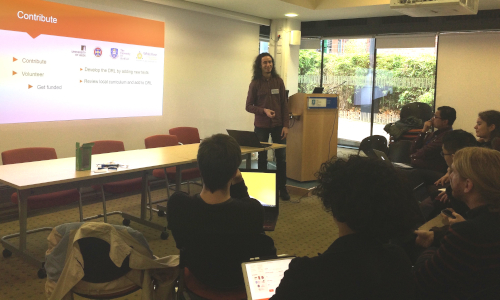
Thanks to everyone who came to the joint DRL-MAP workshop held in Sheffield in November! We had a very fruitful discussion, touching on how syllabi can be developed in tandem with DRL, and how we can make the wider department communities’ diversify their syllabi too. We also added 27 new entries to the DRL! Look forward to more DRL-MAP collaborations in Yorkshire during 2019.DRL and OPEN Scotland
We had a stall at the Online Philosophy & Education Network Scotland launch event on Jan 11th. We are looking forward to developing closer collaborations with OPEN Scotland, working on education and knowledge exchange projects related to diversity and feminism. For now, check out the post we wrote for them.At the Mary Shepherd Philosophy Conference
We also appeared at the recent undergraduate conference focusing on gender, race and discrimination. It was a fantastic, thought-stimulating event, most successful at showing how important and practical diversity issues are in the discipline.Lady Mary Shepherd in stone
The conference inspired a petition to erect a statue of Lady Mary Shepherd in her home town of Edinburgh. We would like to strongly promote this initiative and see this prominent female philosopher represented next to the statues of Hume and Smith. Please sign and promote it!Wikipedia Diversithons
There are two diversity-focused events forthcoming for Wikipedia: one on 15 Feb, based at the Imperial College London and focusing on women in STEM, the other on 20 Feb, based at the University of Edinburgh and focusing on Scottish history and beyond. If you specialise in philosophy of science or history of philosophy, join the events in person or online!CFA
Alice Murphy and Andrea Blomqvist – both active MAP-members and DRL-supporters – are hosting a conference on Learning from Imagination in Leeds, 23-24 May 2019. A call for abstracts have been sent out which you can find here.Volunteer Spotlight: Emily Paul
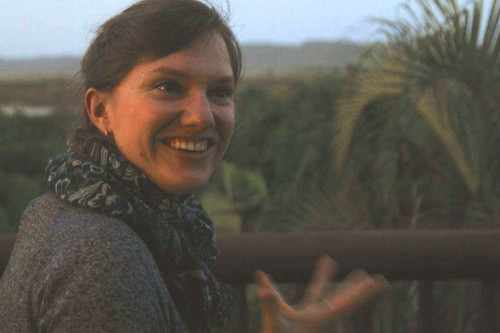
I recently completed my PhD at the University of Leeds, focusing on Philosophy of Religion and Metaphysics. In my experience, Philosophy of Religion is where the lack of diversity is especially blatant. In my first year, I spoke at a conference where I was not only the sole female presenter, but also the sole female delegate. I began to think about stereotype threat a great deal. Meanwhile, a typical UG course focuses on a typically masculine figure of God in a predominantly Christian context, with core readings authored almost exclusively by white men. But there are women and minorities working in this area, and things are improving – I’ve seen some great syllabi, including on a course I taught.And there is the DRL. I’d been aware of it for years – my fellow PhD student, Alison Toop, was heavily involved in it. Towards the end of my PhD, I jumped at the chance to be involved when I saw that Leeds will fund a guest editor. I focused on what I knew, adding 70 new entries in Philosophy of Religion and Metaphysics. I was really pleased to be able to make this contribution. I’ve now left academic Philosophy, but initiatives like the DRL reassure me that ‘sole female delegate’ conferences and exclusively white male syllabi are becoming a thing of the past.
New Text Spotlight
Today we’d like to draw your attention to the edited volume of critical essays by female philosophers entitled Women in Philosophy: What Needs to Change? edited by Katrina Hutchinson and Fiona Jenkins (2013, OUP). This book deals head on with one of the key issues that the DRL is trying to tackle – under-representation of women in academic philosophy. In the publishers note it states: “Often it is assumed that women need to change to fit existing institutions. This book instead offers concrete reflections on the way in which philosophy needs to change, in order to accommodate and benefit from the important contribution women’s full participation makes to the discipline”. We agree! And we think that the DRL is contributing to such change!
Get involved, get funded!
We continuously expand our list and you can help us by contributing papers via our contribution page.
We couldn’t do what we do without the help of our fantastic volunteers. If you would like to join them and volunteer for us please get in touch! There are so many ways to get involved: reviewing public contributions; helping us with small one off jobs; becoming a regular editor; and promoting the DRL at events and online.
You might even be able to access funding to support your time working on the DRL like Emily Paul (see above). We’re keen to support any volunteers in getting this kind of funding. You can read more about this here.
Thanks so much again for all your support,
The DRL Team
-
Expand entry
-
Welcome to the first DRL Newsletter!
Now the flurry of the start of term is over, we’re excited to share what’s been happening at the Diversity Reading List with you.
If you would like to receive future issues of our Newsletter, click here or simply reply to this email.
News
MAP & DRL Workshop
MAP and DRL are putting on a joint event in Sheffield on 10 November 2018. Join us for a one-day workshop of talks and discussions about how to diversify and decolonise the curriculum! There will also be an edit-a-thon, so come prepared with some texts that you want to add and we’ll show you how. Lunch included.
MAP UK Blog
MAP UK have a new blog, where they celebrate, promote, encourage, and support the work of philosophers who are members of under-represented and/or marginalised groups in the discipline. Check it out if you haven’t done so yet! You’ll find a post about the DRL there, too!
Black History Month Event at Leeds
The DRL hosted a session on Monday 29th October on decolonising the curriculum at the University of Leeds as a part of Black History Month. The aim of the session was to encourage similar projects in other disciplines, and to build contacts across the university.
Philosopher Queens
A fantastic new project is seeking crowdfunding. A book about women in philosophy by women in philosophy, The Philosopher Queens, edited by Rebecca Buxton and Lisa Whiting, will include 21 chapters to discuss these badass women and how their amazing ideas have changed the world. Help make this happen and contribute now!
Volunteer Spotlight: Andrea Blomqvist
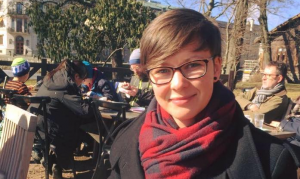 I am a PhD student at the University of Sheffield, working on the interdisciplinary area of affective forecasting. I got involved with DRL as a volunteer during the last year of my undergraduate. My work at DRL has been varied, from adding new entries to finding funding opportunities and promoting DRL at conferences. Last year I received the Petrie Watson Exhibitions grant which allowed me to add 30 new entries to DRL! Currently, I’m organising a joint DRL and MAP workshop with the Sheffield MAP chapter. I’m really happy now that I joined the DRL team even though I then was a bit clueless about what it was – it’s proved a really worthwhile project!
I am a PhD student at the University of Sheffield, working on the interdisciplinary area of affective forecasting. I got involved with DRL as a volunteer during the last year of my undergraduate. My work at DRL has been varied, from adding new entries to finding funding opportunities and promoting DRL at conferences. Last year I received the Petrie Watson Exhibitions grant which allowed me to add 30 new entries to DRL! Currently, I’m organising a joint DRL and MAP workshop with the Sheffield MAP chapter. I’m really happy now that I joined the DRL team even though I then was a bit clueless about what it was – it’s proved a really worthwhile project!Getting involved
We continuously expand our list and you can help us by contributing papers via our contribution page.
If you would like to volunteer for us, get in touch! You can:
- Review public contributions: scan contributions for texts you read and turn them into List entries!
- Small one-off jobs: Did you just teach a course which used texts by authors from under-represented groups? Simply turn your teaching notes into DRL entries!
- Continued involvement: If you have more time to commit, join our team of editors who develop the List on a regular basis!
- Promotion: Help us spread the word at conferences, blogs, social media!
Getting Funded
Did you know you could get funding to support your time working on the DLR? Just recently, the University of Leeds offered a grant to Emily Paul for a project in which she added 70 entries to the DRL. The DLR is keen to support its volunteers in getting this kind of funding. Please get in touch if this is something you’d be interested in to find out what support we can offer. You can read more about this here.
A Little Bit of History
The project began at the University of Leeds in January 2015 led by Simon Fokt. It was developed in response to the stark under-representation of authors from minority groups within academic philosophy, and to the increasing evidence of implicit bias and stereotype threat within the philosophy classroom. Tired of hearing the response – “but what can we do?” – the DRL aimed to show that we can do something, and we can do it now!
What began as a collection of 100 texts in ethics, is now a diverse and ever-expanding database of texts in all areas of philosophy. Since the website launched in June 2015 the project has received a huge amount of support which has enabled it to grow to over 700 texts (and counting!), to redevelop the website so that it is more accessible, and to spread the word about the importance of including under-represented authors in philosophy reading lists far and wide! Have you tried it yet?
Thanks so much again for all your support,
The DRL Team
Diversity Reading List
Newsletter
Nov 18
26
People volunteered their time to date
34
Average daily site visits in the last 90 days
64
People contributed new texts to date
725
Articles available on the DRL now
Our sponsors


















 We collaborated with the MAP chapter at St Andrews and Stirling to put up a
We collaborated with the MAP chapter at St Andrews and Stirling to put up a  I am a Teaching Fellow in medical ethics at the University of Leeds. I have just completed my PhD on the nature of the romantic relationship and the legitimacy of a political institution of marriage. I am currently an Assistant Project Manager for the DRL, but I first got involved back in 2014/15 when Simon Fokt was setting up the project in Leeds. Initially I didn’t feel confident enough to review papers and produce entries for the website – I had only just got back into academic philosophy after a few years in the ‘real world’, and I hadn’t yet started teaching. Luckily there was still loads for me to do. I had a background in writing grant applications for charities, and so I started writing them for the DRL. I also started helping with the promotion of the project online and at events. And that’s what I continue to do today five years later!
I am a Teaching Fellow in medical ethics at the University of Leeds. I have just completed my PhD on the nature of the romantic relationship and the legitimacy of a political institution of marriage. I am currently an Assistant Project Manager for the DRL, but I first got involved back in 2014/15 when Simon Fokt was setting up the project in Leeds. Initially I didn’t feel confident enough to review papers and produce entries for the website – I had only just got back into academic philosophy after a few years in the ‘real world’, and I hadn’t yet started teaching. Luckily there was still loads for me to do. I had a background in writing grant applications for charities, and so I started writing them for the DRL. I also started helping with the promotion of the project online and at events. And that’s what I continue to do today five years later!

